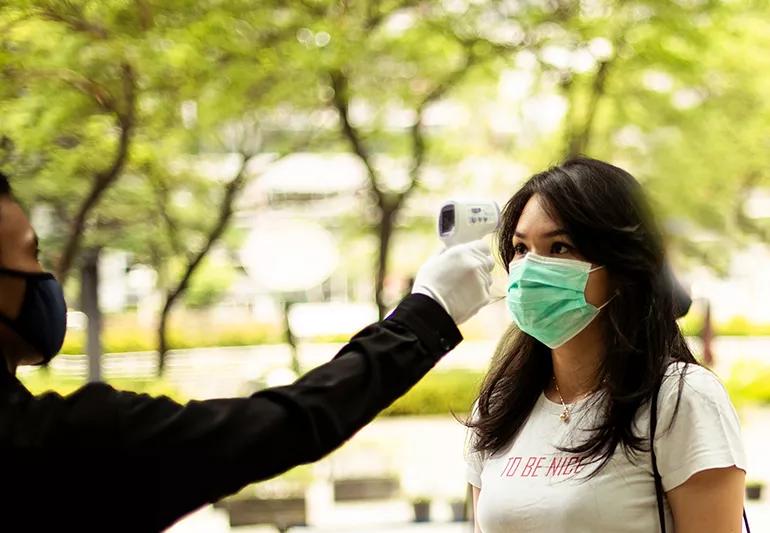The short answer from a family medicine specialist

Image content: This image is available to view online.
View image online (https://assets.clevelandclinic.org/transform/651d72bb-ffaa-4fb8-ba30-b1083779ddce/GettyImages-1219505265-770x533-1_jpg)
Woman having her temperature taken with infrared thermometer
A: With the surge of COVID-19, many hospitals and businesses have implemented temperature screenings for employees, patients and customers using infrared thermometers. These devices offer efficiency, safety and accuracy in detecting fevers in large groups of people. They don’t, however, detect COVID-19 in these individuals.
Advertisement
Cleveland Clinic is a non-profit academic medical center. Advertising on our site helps support our mission. We do not endorse non-Cleveland Clinic products or services. Policy
Research has shown that, when used correctly, infrared or no-contact thermometers are just as accurate as oral or rectal thermometers. No-contact thermometers are popular among pediatricians, as kids often squirm around when trying to get a temperature read, but it also holds true in mass temperature screenings. The device offers safety to both parties while providing a quick and accurate read.
Of course, when available, an internal thermometer is the gold standard in healthcare, but due to COVID-19 and the need to quickly mass test, a no-contact thermometer has become the standard. The operator needs to follow the device’s protocol and it won’t pick up a fever on someone who has taken fever-reducing medication. But with many establishments now requiring temperature checks, these hand-held thermometers are proving to be safe, quick and accurate while helping to reduce the spread of coronavirus.
– Family medicine specialist Neha Vyas, MD.
Advertisement

Sign up for our Health Essentials emails for expert guidance on nutrition, fitness, sleep, skin care and more.
Learn more about our editorial process.
Advertisement
The not-so-sweet heat could be from a medical condition, menopause or even spicy foods
You can use a digital, tympanic or temporal artery thermometer
There’s no one answer, as your temperature fluctuates throughout the day and your life
Use a digital oral, rectal, axillary, ear or forehead thermometer based on your child’s age
Know the risks, the signs and actions you should take
And 4 things you can do to combat heat and cold intolerances
Dressing in multiple layers, drinking warm liquids and taking breaks indoors can help prevent these cold-weather injuries
Heat starts in your chest and moves up to your neck and face … and then, the sweating begins
Although it could be used as a moisturizer, this new trend is not recommended
Communicating clear limits helps protect your time, energy and emotional well-being
High cholesterol can be genetic, but testing and treatment can lower your heart disease risk